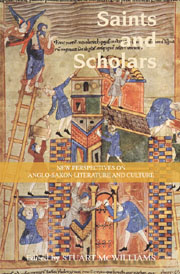 Saints and Scholars
Saints and Scholars Book contents
- Frontmatter
- Contents
- List of Contributors
- Abbreviations
- Introduction
- I Hagiography and the Homiletic Tradition
- II Aspects of Community and Consumption
- 8 Stories from the Court of King Alfred
- 9 De Duodecim Abusiuis, Lordship and Kingship in Anglo-Saxon England
- 10 Reluctant Appetites: Anglo-Saxon Attitudes towards Fasting
- 11 A Note on the Function of the Inscribed Strip from the Staffordshire Hoard
- 12 The Shining of the Sun in the Twelve Nights of Christmas
- 13 Sin and Laughter in Late Anglo-Saxon England: The Case of Old English (h)leahtor
- 14 Marginal Activity? Post-Conquest Old English Readers and their Notes
- III Reflections on Old English Scholarship
- Poems
- Hugh Magennis: A Bibliography, 1981–2011
- Index
- Tabula Gratulatoria
13 - Sin and Laughter in Late Anglo-Saxon England: The Case of Old English (h)leahtor
from II - Aspects of Community and Consumption
Published online by Cambridge University Press: 05 February 2013
- Frontmatter
- Contents
- List of Contributors
- Abbreviations
- Introduction
- I Hagiography and the Homiletic Tradition
- II Aspects of Community and Consumption
- 8 Stories from the Court of King Alfred
- 9 De Duodecim Abusiuis, Lordship and Kingship in Anglo-Saxon England
- 10 Reluctant Appetites: Anglo-Saxon Attitudes towards Fasting
- 11 A Note on the Function of the Inscribed Strip from the Staffordshire Hoard
- 12 The Shining of the Sun in the Twelve Nights of Christmas
- 13 Sin and Laughter in Late Anglo-Saxon England: The Case of Old English (h)leahtor
- 14 Marginal Activity? Post-Conquest Old English Readers and their Notes
- III Reflections on Old English Scholarship
- Poems
- Hugh Magennis: A Bibliography, 1981–2011
- Index
- Tabula Gratulatoria
Summary
Forty years ago I published an essay called ‘Initial h in Old English’. The title was a misnomer, because I dealt only with initial h before vowels, whereas in Old English initial h also occurs before consonants. I did indicate, however, that a later essay would deal with consonantal groups, and although the sequel has never been written, this paper, dedicated to an acknowledged Ælfric scholar, will touch on one aspect of h in that position, particularly in writings by that consummate writer of Old English prose.
The difference between initial h before a vowel in English and one before a consonant which caused me to concentrate on the former is that whereas h before a vowel survives in the spoken variety of the standard language as well as in the written language (except in the generally unstressed pronoun ‘it’, Old English hit), the sound represented by h before a consonant has disappeared in most varieties of speech. I stress most varieties because words with Old English h before w are still pronounced differently from w-words (e.g. wheel and weal) in some dialects, and the historic spelling has invariably survived, although the hw has been inverted to fit in with other non-Germanic h groups (ch, ph, sh, th). The loss of initial h in the written language is thus confined to the groups hl, hn and hr, and this paper will look only at late Old English loss of h in these three consonant combinations.
- Type
- Chapter
- Information
- Saints and ScholarsNew Perspectives on Anglo-Saxon Literature and Culture in Honour of Hugh Magennis, pp. 213 - 223Publisher: Boydell & BrewerPrint publication year: 2012


